BVE 2017
The annual London 3 day event, broadcast video expo has always promoted the latest developments in video technology. I’ve been attending this event for a good number of years, since the days when the Canon XL1 and Sony PD 150 mini DV cameras were the next big thing. DV, HD and 4K video, DSLR’s, drones and 3-D have all taken the limelight over the years as the industry’s next big thing. Last year my write up of BVE 2016 included a few talks on corporate and brand applications for 360 video and the Hack the Planet group VR experience. This wasn’t my introduction to modern VR but was instrumental in my spending the past year exploring this new technology. This year BVE for the first time hosted a dedicated VR section with talks, discussions and demos from some big players in the 360 video side of virtual reality. There was a fair amount of discussion and controversy. Is this just a fad? What are the applications? What type of content works and how can anyone actually make money out of this?
What is virtual reality?
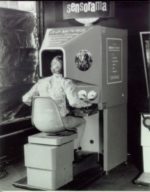
The first primitive headsets date back to the late 60s though the 90s saw the first wave of VR come and go. The past five years of development culminated in 2016 in the launch of the first consumer headsets. The extent to which 360 video can be referred to as VR has been the subject of some debate over the last few years. True VR usually refers to computer-generated interactive experiences. 360 video and other linear immersive experiences allow the viewer to look around freely though not necessarily move or interact with the content. 360 video however, offers a much wider range of real-world experiences and will likely be instrumental in popularising VR in the near term.
VR at BVE 2017
 The VR section at BVE was home to several content producers, a 360 video camera manufacturer, 360 video streaming (Focal Point VR) and remote camera vehicles (Motion Impossible). The BBC and Sky were showing their content along with independent producers Surround Vision and Happy Finish and were giving talks around the expo in all areas of 360 video production. BBC Earth were demoing 3 projects commissioned by Oculus that attempted to integrate the nature documentary tradition with interactive VR.
The VR section at BVE was home to several content producers, a 360 video camera manufacturer, 360 video streaming (Focal Point VR) and remote camera vehicles (Motion Impossible). The BBC and Sky were showing their content along with independent producers Surround Vision and Happy Finish and were giving talks around the expo in all areas of 360 video production. BBC Earth were demoing 3 projects commissioned by Oculus that attempted to integrate the nature documentary tradition with interactive VR. 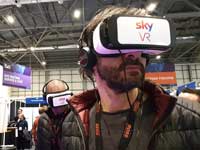 Sky were showing some documentary content, sports and 360 trailers for 2-D movies. Happy Finish showed me a few pieces including a pre concert 3d 360 video where I was able to alternate between the band’s backstage perspective and that of the punters arriving at the concert. Surround vision were showing a selection of clips and documentary style footage a lot of which contained subtle camera movement.
Sky were showing some documentary content, sports and 360 trailers for 2-D movies. Happy Finish showed me a few pieces including a pre concert 3d 360 video where I was able to alternate between the band’s backstage perspective and that of the punters arriving at the concert. Surround vision were showing a selection of clips and documentary style footage a lot of which contained subtle camera movement. 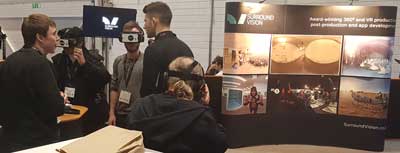 360 filmmaking is in the process of developing it’s own grammar and the amount of camera movement acceptable without creating motion sickness is being worked out by trial and error. Camera movement seems to work best when there is a point of focus or where the characters are moving along at the same speed as the camera. Some of their soaring drone shots were pushing the envelope. I find them exhilarating though I do have quite a high threshold for motion sickness. The medium in which the film is being viewed also plays a part in the style. If watched on a phone or tablet via a ‘magic window’ or by scrolling around within the 360 sphere more traditional filmmaking techniques can be used such as regular camera movement and fast cutting. On a VR headset though, the pace needs to be a lot slower.
360 filmmaking is in the process of developing it’s own grammar and the amount of camera movement acceptable without creating motion sickness is being worked out by trial and error. Camera movement seems to work best when there is a point of focus or where the characters are moving along at the same speed as the camera. Some of their soaring drone shots were pushing the envelope. I find them exhilarating though I do have quite a high threshold for motion sickness. The medium in which the film is being viewed also plays a part in the style. If watched on a phone or tablet via a ‘magic window’ or by scrolling around within the 360 sphere more traditional filmmaking techniques can be used such as regular camera movement and fast cutting. On a VR headset though, the pace needs to be a lot slower.
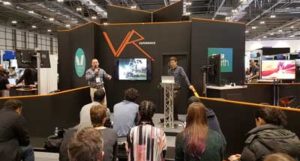 It’s an exciting time to be involved in immersive content creation. We are all in the research and development phase and working out the rules of VR film making as we go. The broadcasters, independent production companies and freelancers. Trial and error is the name of the game. Fail fast and learn quick was a slogan I saw on one slide. Everyone is learning together and there seems to be a healthy atmosphere of collaborative information sharing within the industry.
It’s an exciting time to be involved in immersive content creation. We are all in the research and development phase and working out the rules of VR film making as we go. The broadcasters, independent production companies and freelancers. Trial and error is the name of the game. Fail fast and learn quick was a slogan I saw on one slide. Everyone is learning together and there seems to be a healthy atmosphere of collaborative information sharing within the industry.
The 360 video technology so far
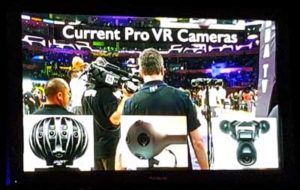 360 cameras are still in the development stage. The nearest thing to an industry standard is the Nokia OZO which at $45,000 is far from cheap. Many have been shooting with arrays of go pros which are cheaper though not without complications. 360 designs were showing off their mini-eye camera rigs using black magic’s new micro cameras. The footage coming from these rigs is some of the best I’ve seen so far. 10 bit gradable 4K video that performs reasonably in low light.
360 cameras are still in the development stage. The nearest thing to an industry standard is the Nokia OZO which at $45,000 is far from cheap. Many have been shooting with arrays of go pros which are cheaper though not without complications. 360 designs were showing off their mini-eye camera rigs using black magic’s new micro cameras. The footage coming from these rigs is some of the best I’ve seen so far. 10 bit gradable 4K video that performs reasonably in low light. 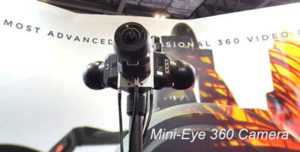 360 designs produce content as well as cameras and their rigs are built with practicality in mind. Although they’ve made many rigs the mini-eye uses 3 or 4 camera mono systems. At present, Stereo 3-D is a lot more cumbersome to deal with in post production than mono and has fewer distribution possibilities. Well produced stereo 360 does however, look a lot better in VR. I also saw a short film from BBC Earth shot at night using an improvised rig consisting of 3 Sony A7S DSLRs. The stitching was far from perfect though it did allow for some unprecedented low light capture. Capturing lowlight 360 footage is for me the biggest bottleneck on quality at the moment. I hope to see this improved in future cameras.
360 designs produce content as well as cameras and their rigs are built with practicality in mind. Although they’ve made many rigs the mini-eye uses 3 or 4 camera mono systems. At present, Stereo 3-D is a lot more cumbersome to deal with in post production than mono and has fewer distribution possibilities. Well produced stereo 360 does however, look a lot better in VR. I also saw a short film from BBC Earth shot at night using an improvised rig consisting of 3 Sony A7S DSLRs. The stitching was far from perfect though it did allow for some unprecedented low light capture. Capturing lowlight 360 footage is for me the biggest bottleneck on quality at the moment. I hope to see this improved in future cameras.
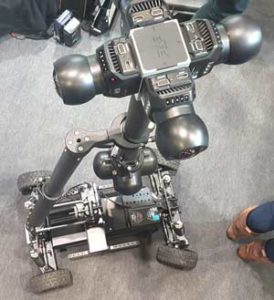 Motion Impossible were demoing their remote vehicles. Creating camera movement without remotes is tricky in 360 as any equipment and crew need to be removed in postproduction which can be costly. Some discussion also centred around the postproduction workflow. Premiere, After Effects and Final Cut Pro X all edit 360 footage well using the Mettle and Dashwood plug-ins. I’ve been using mainly Premiere and the Mettle VR Tools plugin which allows viewing of the timeline directly in VR with my Oculus Rift.
Motion Impossible were demoing their remote vehicles. Creating camera movement without remotes is tricky in 360 as any equipment and crew need to be removed in postproduction which can be costly. Some discussion also centred around the postproduction workflow. Premiere, After Effects and Final Cut Pro X all edit 360 footage well using the Mettle and Dashwood plug-ins. I’ve been using mainly Premiere and the Mettle VR Tools plugin which allows viewing of the timeline directly in VR with my Oculus Rift.
These are early days for 360 filmmaking and the technology is developing fast. At present the resolution of 360 video compared to computer-generated VR or regular flat 2-D video is a long way behind. There were a few disappointed faces from video professionals raised on HD and trying 360 for the first time. Regular video however, has had decades to develop whereas 360 has had only a few years. We are at present able to shoot 8K 360 though the bottleneck seems to be more in the headsets.
Is VR just a fad?
 Several years ago 3-D was being pushed as the latest development in the video production industry. 3-D TV sales however, didn’t live up to the hype and some video professionals investing in the technology got their fingers burnt. Many are quite rightly cautious about the future of VR. I’ve heard many opinions on this over the past few years and BVE was no exception. Even the sceptics admit that VR certainly has some applications such as training and education (plus gaming and porn obviously). Whether it has a long term role in broadcast, advertising, events, sports and filmmaking is yet to be seen. Some 360 videos can certainly create more emotional impact, empathy and retention than their
Several years ago 3-D was being pushed as the latest development in the video production industry. 3-D TV sales however, didn’t live up to the hype and some video professionals investing in the technology got their fingers burnt. Many are quite rightly cautious about the future of VR. I’ve heard many opinions on this over the past few years and BVE was no exception. Even the sceptics admit that VR certainly has some applications such as training and education (plus gaming and porn obviously). Whether it has a long term role in broadcast, advertising, events, sports and filmmaking is yet to be seen. Some 360 videos can certainly create more emotional impact, empathy and retention than their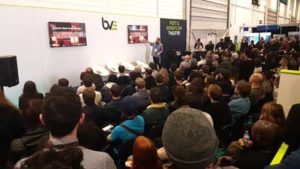 flatscreen counterparts though not all subject matter warrants a VR experience.
flatscreen counterparts though not all subject matter warrants a VR experience.
Low video resolution is definitely a problem at the moment and stops me from watching too much content. At the end of the day, no matter how cool VR is, the public will decide on its future.
Monetisation and the future of VR
Gaming was always going to be the biggest uptake of VR and gamers are happy to pay for good content. Whether the public will pay for VR video has yet to be seen. Certainly, branded content and promotional VR could pay as could other forms of corporate VR. My guess is that it will be social VR that drives the future. With Facebook backing and emerging platforms such as Second Life’s Sansar, many new revenue streams could emerge. When we can hang out together with usable avatars, share content and experience virtual worlds, games, education and entertainment it will be a much more appealing place. The hardware needs to become a lot more wearable though it is largely content that will decide the future of VR. This is likely to be collaborative in nature drawing on many different forms of media. Presence, immersiveness and agency are highly desirable for certain things though our appetite for interactivity in story telling is uncertain when we are used to being so passive. I feel that the potential for VR is great and I’m keen to see it flourish. The video production industry has a great role to play in this gateway period. I hope we succeed in finding new and exciting forms of media, film and audio-visual content.
Article by Ian Burke, founder of London based video production company ‘Promovideo’


??? ????????? ??????? ? ??? ?? ???? !: http://mrua.2track.info